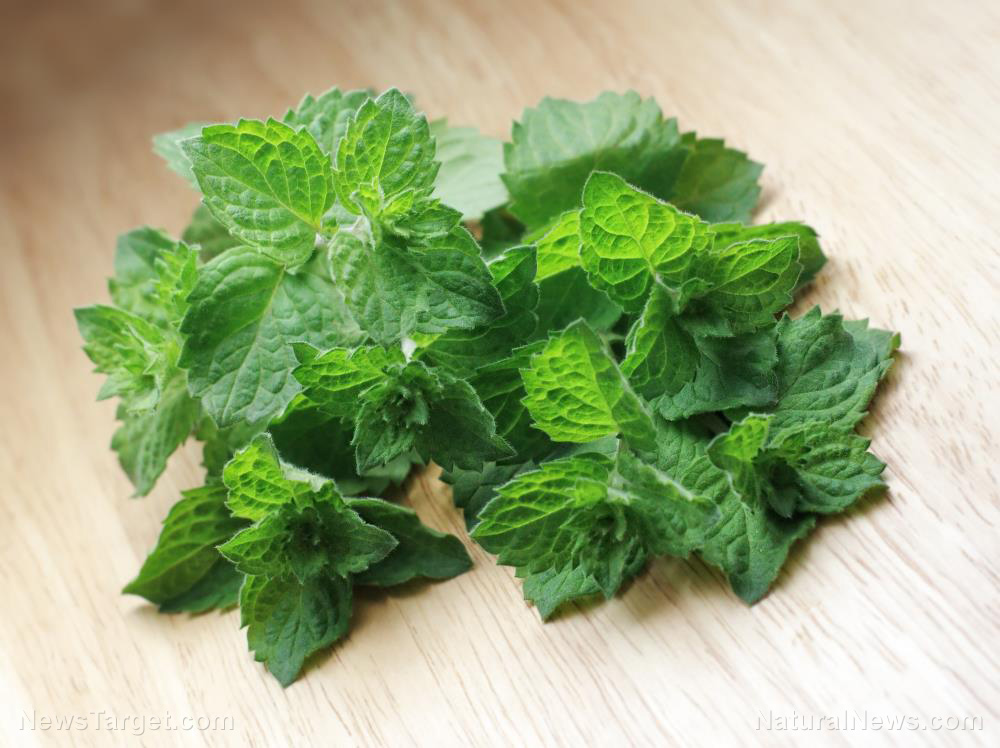Spearmint is a cool way to boost your cognitive focus and attention
09/11/2019 / By Melissa Smith

Spearmint is commonly used to freshen your breath. However, new research shows that it could also boost your attention. A study published in the journal Nutrition Research found a link between spearmint extract supplementation and enhanced attention.
For the study, researchers from Kemin Foods and the MusclePharm Sports Science Institute examined whether spearmint could improve cognitive performance in young, active individuals. To do this, they recruited 142 recreationally active men and women aged 18 to 50. The participants were randomly divided into two groups. One group took 900 milligrams (mg) of spearmint extract supplement, which contained around 14.5 percent rosmarinic acid and 24 percent phenolic acid compounds. The other group received a placebo capsule. Both groups took their assigned supplements every day for 90 days. Each group has similar numbers of young (18-35 years old) and older (36-50 years old) participants of both sexes.
During lab visits on days 7, 30, and 90, the participants took cognitive tests, which measured their attention and processing speed. They also completed surveys regarding their sleep, mood, and quality of life.
The researchers found that supplementation of spearmint extract resulted in an 11 percent increase in sustained attention performance, compared with 0.6 percent increase in the placebo treatment. This improvement is a significant cognitive benefit for individuals, both at work and during recreational activities. While they did not observe significant differences in mood, sleep, or quality of life, they suggested that spearmint supplementation could improve cognitive performance in young, active people.
In this study, the researchers used Neumentix, a branded spearmint extract manufactured and sold by Kemin, which also funded the study. (Related: Eat more spearmint for better health.)
Spearmint also improves sleep and memory in older adults
Older people may also benefit from taking spearmint supplements. A study published in the Journal of Alternative and Complementary Medicine suggested that spearmint can help older adults enhance their short-term memory and improve their sleep.
The researchers looked at the effects of spearmint supplementation on cognitive performance, sleep, and mood in older adults with age-related memory impairment. They recruited 90 participants aged 50-70 years old.
The researchers randomly divided the participants into three groups with 30 members each. One group took a 600 mg spearmint supplement, another group consumed 900 mg, and the third group received a placebo. They took two capsules of their assigned supplement every morning for 90 days.
The participants retained their regular diet and exercise routines and maintained consistent sleep duration during the evening before study visits. They completed questionnaires that assessed their cognitive performance, mood, and sleep.
The researchers found that participants who took 900 mg of spearmint exhibited a 15 percent improvement in working memory compared to those who took the placebo. The participants also reported improvement in the time they took to fall sleep. Based on these findings, the researchers concluded that spearmint supplementation shows promise as an ingredient for improved cognitive function and sleep – both of which may improve the overall quality of life in the elderly.
Spearmint protects existing brain cells
Various studies suggested that these cognitive-boosting effects of spearmint can be attributed to its phenolic compounds. These compounds protect existing neurons and positively affect the blood vessels that support and nourish them.
For one, spearmint phenolics inhibit acetylcholinesterase, which is an enzyme that breaks down acetylcholine, a neurotransmitter associated with memory. These compounds also fight against oxidative stress. A mouse study revealed that rosmarinic acid in spearmint exhibited a protective effect on key memory regions of the brain against cellular damage from oxidative stress.
Additionally, preliminary lab and animal studies also suggested that phenolics in spearmint promote the formation of new brain cells. In particular, rosmarinic acid greatly improved new cell growth in cell cultures from the hippocampus, the brain region responsible for working memory.
Sources include:
Submit a correction >>
Tagged Under:
aging secrets, alternative medicine, anti-aging science, attention, brain function, brain health, cognitive function, cogntive health, herbal medicine, Herbs, Mentha spicata, natural cures, natural medicine, phenolic compounds, phytonutrients, prevention, remedies, research, Rosmarinic acid, spearmint, supplements
This article may contain statements that reflect the opinion of the author
RECENT NEWS & ARTICLES
BrainFunction.News is a fact-based public education website published by Brain Function News Features, LLC.
All content copyright © 2018 by Brain Function News Features, LLC.
Contact Us with Tips or Corrections
All trademarks, registered trademarks and servicemarks mentioned on this site are the property of their respective owners.





















